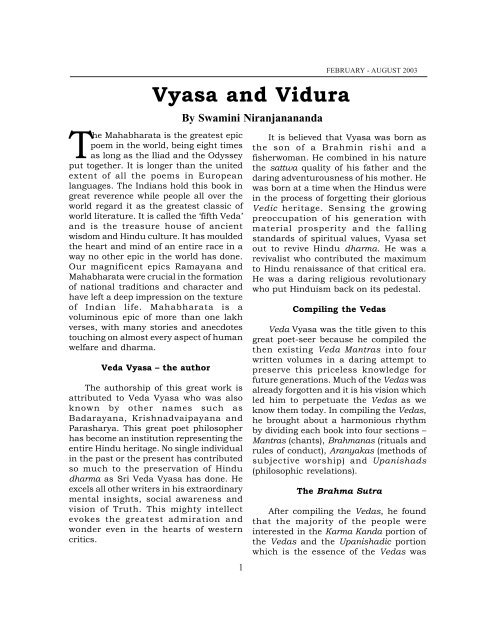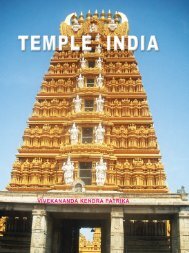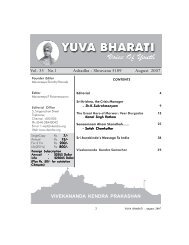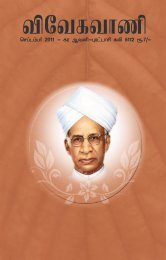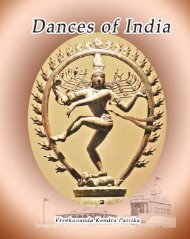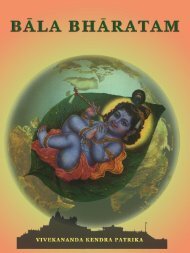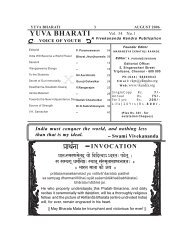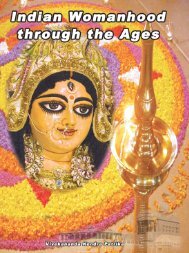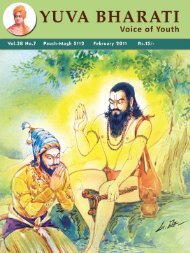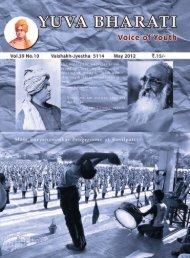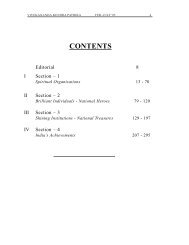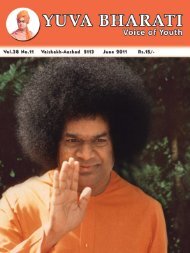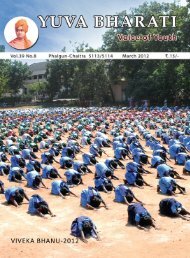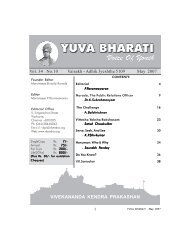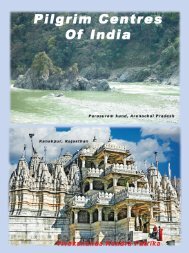Epics in Imprints-1.pdf - Vivekananda Kendra Prakashan
Epics in Imprints-1.pdf - Vivekananda Kendra Prakashan
Epics in Imprints-1.pdf - Vivekananda Kendra Prakashan
Create successful ePaper yourself
Turn your PDF publications into a flip-book with our unique Google optimized e-Paper software.
Vyasa and Vidura<br />
The Mahabharata is the greatest epic<br />
poem <strong>in</strong> the world, be<strong>in</strong>g eight times<br />
as long as the Iliad and the Odyssey<br />
put together. It is longer than the united<br />
extent of all the poems <strong>in</strong> European<br />
languages. The Indians hold this book <strong>in</strong><br />
great reverence while people all over the<br />
world regard it as the greatest classic of<br />
world literature. It is called the ‘fifth Veda’<br />
and is the treasure house of ancient<br />
wisdom and H<strong>in</strong>du culture. It has moulded<br />
the heart and m<strong>in</strong>d of an entire race <strong>in</strong> a<br />
way no other epic <strong>in</strong> the world has done.<br />
Our magnificent epics Ramayana and<br />
Mahabharata were crucial <strong>in</strong> the formation<br />
of national traditions and character and<br />
have left a deep impression on the texture<br />
of Indian life. Mahabharata is a<br />
volum<strong>in</strong>ous epic of more than one lakh<br />
verses, with many stories and anecdotes<br />
touch<strong>in</strong>g on almost every aspect of human<br />
welfare and dharma.<br />
Veda Vyasa – the author<br />
The authorship of this great work is<br />
attributed to Veda Vyasa who was also<br />
known by other names such as<br />
Badarayana, Krishnadvaipayana and<br />
Parasharya. This great poet philosopher<br />
has become an <strong>in</strong>stitution represent<strong>in</strong>g the<br />
entire H<strong>in</strong>du heritage. No s<strong>in</strong>gle <strong>in</strong>dividual<br />
<strong>in</strong> the past or the present has contributed<br />
so much to the preservation of H<strong>in</strong>du<br />
dharma as Sri Veda Vyasa has done. He<br />
excels all other writers <strong>in</strong> his extraord<strong>in</strong>ary<br />
mental <strong>in</strong>sights, social awareness and<br />
vision of Truth. This mighty <strong>in</strong>tellect<br />
evokes the greatest admiration and<br />
wonder even <strong>in</strong> the hearts of western<br />
critics.<br />
By Swam<strong>in</strong>i Niranjanananda<br />
1<br />
FEBRUARY - AUGUST 2003<br />
It is believed that Vyasa was born as<br />
the son of a Brahm<strong>in</strong> rishi and a<br />
fisherwoman. He comb<strong>in</strong>ed <strong>in</strong> his nature<br />
the sattwa quality of his father and the<br />
dar<strong>in</strong>g adventurousness of his mother. He<br />
was born at a time when the H<strong>in</strong>dus were<br />
<strong>in</strong> the process of forgett<strong>in</strong>g their glorious<br />
Vedic heritage. Sens<strong>in</strong>g the grow<strong>in</strong>g<br />
preoccupation of his generation with<br />
material prosperity and the fall<strong>in</strong>g<br />
standards of spiritual values, Vyasa set<br />
out to revive H<strong>in</strong>du dharma. He was a<br />
revivalist who contributed the maximum<br />
to H<strong>in</strong>du renaissance of that critical era.<br />
He was a dar<strong>in</strong>g religious revolutionary<br />
who put H<strong>in</strong>duism back on its pedestal.<br />
Compil<strong>in</strong>g the Vedas<br />
Veda Vyasa was the title given to this<br />
great poet-seer because he compiled the<br />
then exist<strong>in</strong>g Veda Mantras <strong>in</strong>to four<br />
written volumes <strong>in</strong> a dar<strong>in</strong>g attempt to<br />
preserve this priceless knowledge for<br />
future generations. Much of the Vedas was<br />
already forgotten and it is his vision which<br />
led him to perpetuate the Vedas as we<br />
know them today. In compil<strong>in</strong>g the Vedas,<br />
he brought about a harmonious rhythm<br />
by divid<strong>in</strong>g each book <strong>in</strong>to four sections –<br />
Mantras (chants), Brahmanas (rituals and<br />
rules of conduct), Aranyakas (methods of<br />
subjective worship) and Upanishads<br />
(philosophic revelations).<br />
The Brahma Sutra<br />
After compil<strong>in</strong>g the Vedas, he found<br />
that the majority of the people were<br />
<strong>in</strong>terested <strong>in</strong> the Karma Kanda portion of<br />
the Vedas and the Upanishadic portion<br />
which is the essence of the Vedas was


